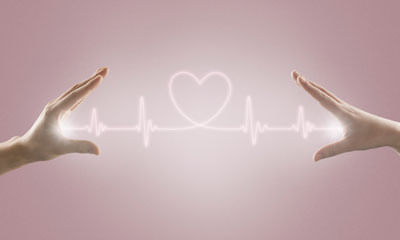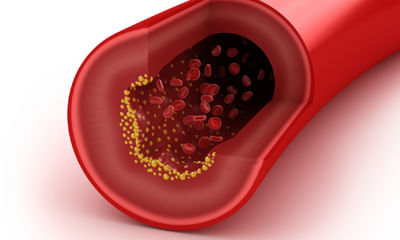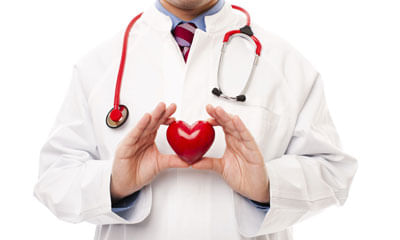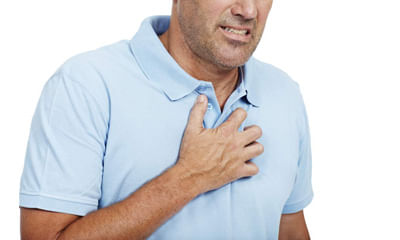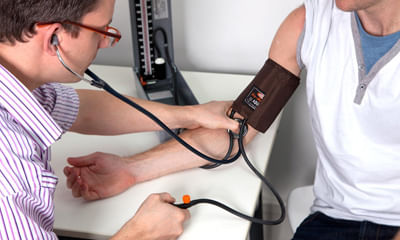Small Vessel Ischemia
All problem start after a stroke! mri finding: small blood vessel ischemia changes in brain after edema doctor suggest e ...
Ask Free Question
I am sorry to hear about your concern but will be happy to assist you. Microvascular ischemic disease is a term that's used to describe changes to the small blood vessels in the brain. Changes to these vessels can damage white matter — the brain tissue that contains nerve fibers and serves as the connection point to other parts of the brain. Let's connect over a call so that we can discuss your concern in details and make a suitable treatment plan for you.
I was admitted to hospital a week ago with symptom of ghabrahat from last 2 days. On several check up in hospital, I am ...
Ask Free Question
Hello Mr. lybrate-user, your stress thallium report says "no scan evidence of stress-induced reversible ischemia" -,it means even under stress there was no compromise in the blood supply in the area supplied by the blocked artery (rca 80%) so no angioplasty is needed now. You should just continue with the medication advice and follow good lifestyle -- regular exercise/ daily 2-3 km walking- restricted -low-fat diet - and follow up with your doctor if any new symptoms arise. Cholesterol levels are very high so a low-fat diet should be followed with rosuvas which is advised.
What is hypokinesia /cad/ischemia, Is it complex problem it can be cured or not? Please suggest me. ...
Ask Free Question
Hypokinesia refers to decreased bodily movement. One of the two categories of movement disorders, hypokinesia is characterized by a partial or complete loss of muscle movement due to a disruption in the basal ganglia. Coronary artery disease (CAD) is the most common type of heart disease. It is one of the leading cause of death in India & US in both men and women. CAD happens when the arteries that supply blood to heart muscle become hardened and narrowed Ischemia or ischaemia is a restriction in blood supply to tissues, causing a shortage of oxygen that is needed for cellular metabolism (to keep tissue alive). Ischemia is generally caused by problems with blood vessels, with resultant damage to or dysfunction of tissue. They are serious conditions but are treatable.
What is atherosclerosis and ischemia? I have cholesterol and high blood pressure. They said I must use virgin coconut oi ...
Ask Free Question
Atherosclerosis is deposition of cholesterol on inside vessels. Ischaemia is result of atherosclerosis means decreased blood supply.
Sudden chest pain. After ecg it shown t-wave inversion in interior what is that mean? And they suggest for operation, sh ...
Ask Free Question
Myocardial ischemia (mi) is the common cause of t wave inversion due to insufficient oxygen supply to your heart leading to unstable angina. There may be blocked blood vessels ,supplying to heart or rapture of a atherosclerotic plaque. This is as life threatening condition, that is why your doctor suggest for operation. Constant low haemoglobin is one of the major cause responsible for it.
Hi sirs! my 'TMT test is negative for induced ischemia heart disease what does it means? ...
Ask Free Question
Dear Lybrateuser, - A negative tmt test means that your heart is functioning well while there is an increase demand on it to pump blood during exercise that means the blood vessels are normal with no sign of blockage in them.
Hi sir I am suffering the chest pain last one month as per my tmt report positive provocable ischemia, my doctor give me ...
Ask Free Question
Positive TMT means major problem like major blockage in blood vessel in the heart, you need further evaluation to confirm that you should go and meet a cardiologist as soon as possible for BP. You need to understand about high blood pressure. Normal range of blood pressure is between 90/60 to 140/90, anything above or below is is abnormal. Many factors can affect blood pressure, including: 1) The amount of water and salt you have in your body 2) The condition of your kidneys, nervous system, or blood vessels 3) Your hormone levels 4) your lifestyle - smoking, drinking, exercise Stress, less sleep, smoking, alcohol, overweight, heart, kidney problems, lack of physical exercise. All of these can cause High blood pressure. You are more likely to be told your blood pressure is too high as you get older. This is because your blood vessels become stiffer as you age. When that happens, your blood pressure goes up. Highblood pressure increases your chance of having a stroke, heart attack, heart failure, kidney disease, or early death. DASH stands for Dietary Approaches to Stop Hypertension. DASH lowers high blood pressure and improves levels of cholesterol. This reduces your risk of getting heart disease. The DASH Diet Emphasizes vegetables, fruits, and fat-free or low-fat dairy products. Includes whole grains, fish, poultry, beans, seeds, nuts, and vegetable oils. Limits sodium, sweets, sugary beverages, and red meats. Along with this, other lifestyle changes can help lower your blood pressure. They include staying at a healthy weight, exercising, and not smoking. My advice to you would be 1) Keep a BP daily record for at least one week & Every time you need to measure BP twice with a gap of 15 mins 2) Basic tests should be one to rule out cardiac / kidney issues 3) unless any recent evaluation has been done I would advice these test ECG ECHO Lipid Profile TSH KFT Renal doppler Get back to me with a detailed history and old / new records for a better individualized advice.
The Rubella infection occur after 15 week of pregnancy. If Foetus not infected then rubella IgM TITRE increases or decre ...
Ask Free Question
Fetal infection is acquired hematogenously, and the rate of transmission varies with the gestational age at which maternal infection occurs. After infecting the placenta, the rubella virus spreads through the vascular system of the developing fetus, causing cytopathic damage to blood vessels and ischemia in developing organs.16 When maternal infection/exposure occurs in the first trimester, fetal infection rates are near 80%, dropping to 25% in the late second trimester and increasing again in the third trimester from 35% at 27–30 weeks’ gestation to nearly 100% beyond 36 weeks’ gestation. The risk of congenital defects has been reported to be 90% when maternal infection occurs before 11 weeks of gestation, 33% at 11–12 weeks, 11% at 13–14 weeks, 24% at 15–16 weeks, and 0% after 16 weeks.7 Therefore, the risk of congenital defects after maternal infection is essentially limited to the first 16 weeks of gestation. Little, if any, risk of CRS is associated with infection beyond 20 weeks, and FGR seems to be the only sequela of third trimester infection
I am a 40 years old male having Hypertension for the past 5 years I was taking Telma 40 morning and amlong 5 mg evening ...
Ask Free Question
The combination of medicines prescribed to you are taking care of symptom of your weakness in cardiac function. We are specializing in ayurvedic treatment for reduction of blockages, strengthening of heart function, heart muscles and we have been able to show good results seen in 2D Echo and Carotid Doppler that measures the plaque in blood vessels. Please take a formal appointment with our clinic on Lybrate for the best advantage. It will do you great advantage. At the same time, please learn to relax, change your diet for heart healthy diets, mild exercise to help circulation and balance your blood profile. Keep targeting to improve your health in such a manner that the burden of medicines can be reduced to minimum. Our ayurvedic medicines are to be taken for 3 to 6 months to show clinical changes. Best wishes.
I am 66 year male now whenever we walk fast or use stairs for 3rd floor feel breathing problem this is for last 6 months ...
Ask Free Question
Dear, the breathing discomfort might be attributed to angina, it is a condition in which during exercise or when the demand for oxygen is more to the heart muscles the blood vessels are not able to supply adequate blood to the heart. To diagnose this and confirm you need to get your investigations done which include your routine cbc esr, blood sugar, lipid profile and then meet a cardiologist and get a treadmill stress test done. In this test the heart rate is increased under monitoring to diagnose the ischemia. On confirmation of the diagnosis, the cardiologist would suggest you to go for an angiography. This is now a days a fairly common disease and since you are facing the symptom it is advisable not the neglect the same and move fast. I would suggest as per my knowledge that you start taking low dose asprin (75 mg) or so after consulting your doctor which will keep the blood thin. Best of luck.

